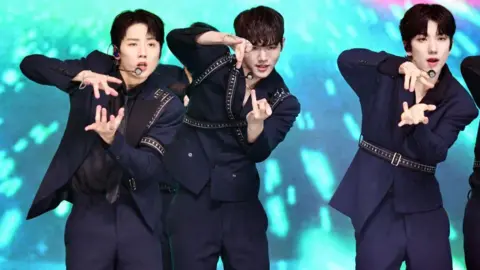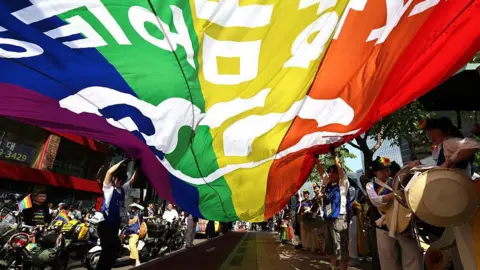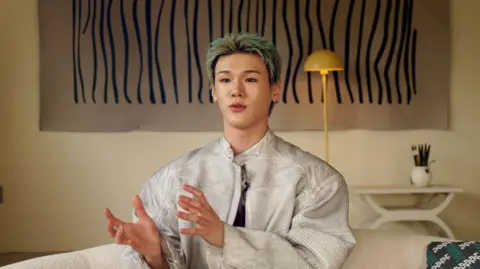Bain was halfway through his band’s Los Angeles concert on a crisp April night when the music stopped.
In an oversized fur coat and black sunglasses, the 24-year-old K-pop star told thousands of fans: “Before I start the next song – I want to share something with you guys.”
A brief pause and then: “I’m [expletive] proud to be part of the LGBTQ community!”
The crowd erupted in applause and screams as Bain broke into Lady Gaga’s pride anthem: “Just put your paws up, ‘Cause you were born this way, baby”.
In that moment, as he came out to the world, he was not nervous, he tells the BBC in an interview at his studio in Seoul – rather, he had been trying to “sound cool”.
A handful of K-pop artists have come out as gay in recent years – but none as publicly as Bain.
Even in 2025, that is a bold move in South Korea’s entertainment industry, where stars are held to impossible standards. Admitting to even a heterosexual relationship is scandalous.
“There were some people in the industry who knew [I was thinking of coming out] and warned me against it, saying it would be a risk,” Bain says. “And of course I thought about the risk – that we might lose fans.
“But then I thought, society is changing… I might gain more than I might lose.”
That’s the big question: has he thrown open the door to change in an industry that has become global but remains deeply rooted in a conservative South Korea?
‘I thought I could just pretend’
Bain, whose real name is Song Byeonghee, says he was in secondary school, about 12 years old, when he realised he was gay.
Shortly afterwards, he decided to become a K-pop trainee but he kept his sexuality a secret – he felt like being gay was “not allowed”.
“It wasn’t something I questioned… I just thought I had no choice,” he says. “There was no-one else [around me that was gay]. I thought I could just pretend and keep going.”
 BBC Korean/Jungmin Choi
BBC Korean/Jungmin ChoiWealthy, modern South Korea is still traditional in many ways. Powerful yet conservative churches often see homosexuality as a disability or sin. And same-sex marriage is not legally recognised.
In 2021, Bain made his debut as part of a six-member boyband, Just B. They have released several albums and have taken part in reality shows, earning a dedicated audience.
But through it all, the years of hiding a part of himself took a toll on Bain.
“I was so overwhelmed, I thought maybe I can’t be an idol at all. I felt I’d been hiding so much. I decided to talk to Mom.”
That was about three years ago. His mother was the first person in his family to find out: “We talked for an hour, and I finally said, ‘I like men more than women.’ That’s when she knew.”
Her reaction was difficult for him. “Honestly, she didn’t like it – not at first. She said she thought I could overcome it, that maybe I’d someday like women. She felt sad… that I’d now face bad reactions from others. But [she] said, ‘You’re my son, so I love you, I support you, I love you.’ It was mixed. I was sad, but in the end grateful she said she loves me.”
Then his team members and company began encouraging him to take the leap – and tell the world.
Earlier this year the band began a world tour, and on the last stop of their US tour, Bain decided to come out on stage.
 Getty Images
Getty ImagesSince then, the band has been thrust into the spotlight – with Bain giving countless interviews as he quickly became the new face of the Korean LGBTQ community.
“I feel like I’ve changed a lot since coming out. I feel more confident. When I meet someone new, I show who I am immediately,” he says. “But I also feel sad that my identity is such a big deal now.”
Over time, he hopes, people will stop saying “oh, he’s gay, but rather, oh, that’s just who he is”.
The taboos in K-pop
When South Korean actor Hong Seok-Cheon came out as gay in 2000, LGBTQ representation truly entered the country’s mainstream.
He was the first Korean celebrity to open up about his sexuality – and it came at a cost. He was dropped from TV shows and advertisements.
Attitudes have certainly changed since then. A Pew survey from 2019 showed that the number of people who accepted homosexuality has risen to 44% from 25% in 2002.
And yet, only a handful of other celebrities have come out. In 2018, Holland became the country’s first openly gay K-pop artist and, in 2020, Jiae, a former member of girl group Wassup, came out as bisexual. Both have said they found it hard to sign with a record label as a result.
Bain’s announcement, however, has been celebrated by both fans and South Korea’s LGBTQ community.
“When someone like an idol comes out, it gives people like me a sense that we are not alone,” says a 26-year-old Korean transgender woman, who does not want to be named.
“It brings comfort…makes me think, maybe I’m ok the way I am.”
Online too, a majority of the comments have been positive. One gay fan in a YouTube comment wrote how he was encouraged by Bain, after feeling “so much despair” over “the hateful comments” and discrimination.
“But thanks to Bain, I’ve found the courage to keep going.”
 Getty Images
Getty ImagesInternational fans have especially cheered him on: “After the initial shock, I started to cry,” said Lia, a K-pop fan from the US who identifies as lesbian.
“Knowing that Korea still has some repression against LGBTQ people, the bravery and courage he displayed by coming out…[was] admirable.”
South Korea’s cultural footprint has been growing globally, and that has brought fans from everywhere, with their own perspectives and beliefs. They may well reshape the K-pop industry.
But that will take time. And that is evident in the range of comments in response to Bain’s announcement – disapproval to apathy.
For one, the country has seen a rise in right-wing, often avowed anti-feminist beliefs in young men, who seem to oppose any challenge to traditional gender roles.
And those roles remain strong in South Korea. The government and the church champion conventional family values, encouraging young people to marry and have children so they can boost birth rates, currently the lowest in the world.
Given all that, it may not be a surprise that homosexuality is still a taboo, even in a global industry like K-pop.
This is a world where even straight couples don’t talk about their private lives, says critic Lim Hee-yun.
“K-pop has spent nearly 25 years avoiding the topic of sexuality [altogether]. Even heterosexual relationships are hidden to protect fan fantasies.”
 BBC Korean/Jungmin Choi
BBC Korean/Jungmin ChoiBain, he adds, has “challenged that silence in a symbolic and powerful way. I believe it marks a major moment”.
But he believes fans may have reacted very differently – “it might have been explosive” – if a member of a global boyband had come out as gay.
“Bain’s case was significant, but his group isn’t as famous [so] it didn’t cause as much stir domestically,” Mr Lim says.
Bain has certainly helped raise awareness, he agrees. “It’s a slow process but we’re seeing more public figures speaking up or content being created around these LGBTQ issues.”
But any immediate change in K-pop or the entertainment industry is unlikely, according to him.
“It’s not just a social issue – it’s a market issue. Male idols usually have a much larger female fanbase… [and] if you find out your favourite male idol is gay, that can shatter the illusion that you could one day be the object of his affection,” he says.
“So if they do [come out] they risk shaking the foundation their fandom is built on.”
Bain, however, says his decision would be worth it if even “one person in K-pop gains strength or interest” from it.
“I’ve spent so long pretending… I realised that because I came out, others felt safe to do so too.”
The day he came out, he recalls, several fans approached him, saying they were gay or lesbian, talking about their own identity.
“They thanked me and I thought to myself ‘I should have done this sooner’.”



